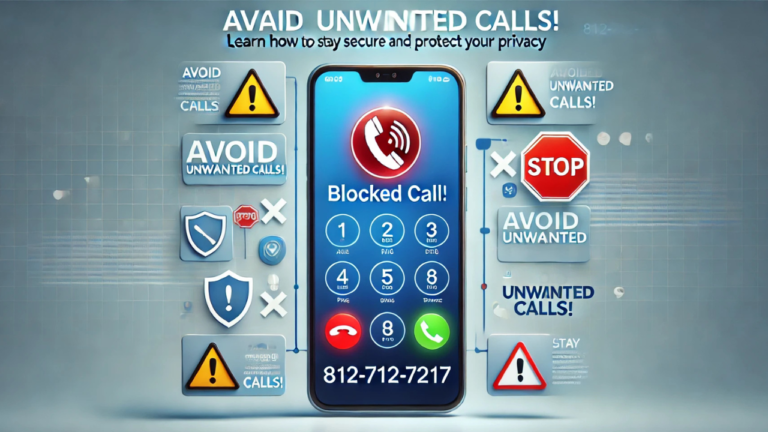In today digital age, receiving unsolicited phone calls has become an all-too-common experience. One such number frequently reported is 812-712-7217, which many individuals identify as a source of nuisance calls. These calls can range from harmless telemarketing pitches to fraudulent schemes aimed at exploiting personal or financial information. Understanding the origin and intent of such calls is essential to safeguard your privacy and security.
Read More:7 Powerful Lessons on Fearlessness and Respect from ‘I Fear No One, But Respect Everyone. – Tymoff
The Nature of Calls from 812-712-7217
Reports suggest that 812-712-7217 is linked to various activities, including telemarketing campaigns, automated robocalls, and potential scam operations. Telemarketing calls are often made to promote a product or service, but when they become incessant, they can feel invasive and unwelcome. Robocalls, on the other hand, are automated messages designed to reach large audiences quickly, often for promotional purposes. However, scammers can misuse these technologies, creating a more sinister form of nuisance that preys on unsuspecting individuals.
When dealing with calls from numbers like 812-712-7217, it’s essential to remain vigilant. Scammers often disguise their true intentions behind enticing offers, such as claiming you’ve won a prize or are eligible for a financial incentive. Recognizing the tactics they use can help you stay ahead of potential threats.
Why These Calls Pose a Risk
Receiving calls from numbers like 812-712-7217 isn’t just an inconvenience; it can have serious implications for your personal and financial security. One of the most significant risks is identity theft. Scammers may ask for sensitive information such as Social Security numbers, bank account details, or credit card information. Sharing such details can lead to unauthorized transactions or worse, full-blown identity theft.
Another risk is the increase in spam calls. Answering calls from suspicious numbers confirms your number is active, making it more likely to be shared or sold to other telemarketers or scammers. Over time, this can result in a surge of unwanted calls, further disrupting your daily life.
Additionally, the psychological impact of persistent nuisance calls cannot be overlooked. Constant interruptions can lead to frustration, anxiety, and a diminished sense of privacy. For some, it can even create a fear of answering unknown numbers, impacting both personal and professional communication.
How to Handle Calls from 812-712-7217
Dealing with unwanted calls starts with knowing how to respond appropriately. When you receive a call from 812-712-7217, it’s best to avoid answering if you don’t recognize the number. If you do answer, avoid sharing any personal or financial information. Scammers often create a sense of urgency to pressure you into making hasty decisions, but staying calm and skeptical can protect you from falling into their trap.
If you suspect a call to be fraudulent, hanging up is the safest option. You can then block the number using your phone’s call-blocking features. Many smartphones and mobile carriers offer tools to help identify and block suspicious numbers. Additionally, third-party apps like Truecaller and Hiya can provide an extra layer of protection by flagging known spam numbers like 812-712-7217.
Reporting suspicious calls is another crucial step. Sharing your experience with organizations like your mobile carrier or the Federal Trade Commission (FTC) helps track fraudulent activity and protect others from similar scams. While no single solution can eliminate spam calls entirely, taking these steps can significantly reduce their frequency and impact.
The Importance of Staying Vigilant
In a world where communication technologies are constantly evolving, staying informed about threats like 812-712-7217 is vital. Awareness is your first line of defense. By recognizing the warning signs of fraudulent calls and understanding the risks involved, you can make informed decisions about how to handle them.
Educating yourself and others about these risks fosters a safer communication environment. Whether it’s advising family members to avoid sharing personal information over the phone or encouraging colleagues to use call-blocking tools, collective vigilance can create a significant barrier against scams.
Safeguarding Your Privacy
Protecting your privacy requires a proactive approach. Start by limiting the sharing of your phone number online or in public forums, as this can reduce the chances of it being targeted by telemarketers or scammers. Regularly review your phone’s privacy settings and enable features that screen or block unknown numbers.
If you’ve already received calls from 812-712-7217, take steps to minimize further disruption. Report the number to your carrier and consider adding it to a blocklist. By doing so, you not only protect yourself but also contribute to efforts aimed at curbing spam and fraudulent calls on a larger scale.
FAQs
1. What is 812-712-7217? 812-712-7217 is a phone number often associated with telemarketing, robocalls, and potential scams. Reports suggest it is frequently used for unsolicited and potentially fraudulent calls.
2. How can I stop calls from 812-712-7217?
You can block the number using your phone’s call-blocking features or third-party apps like Truecaller. Reporting the number to your carrier or the FTC can also help.
3. Is it safe to answer calls from 812-712-7217?
It’s best to avoid answering calls from unfamiliar numbers. If you do answer, refrain from sharing personal or financial information.
4. What should I do if I suspect a call from 812-712-7217 is a scam? Hang up immediately and report the number. Blocking the number and using spam-filtering tools can prevent future calls.
5. Why am I receiving calls from 812-712-7217? Your number may have been added to a telemarketing or spam call list. Engaging with these calls, even briefly, can increase the likelihood of receiving more.
Conclusion
Understanding the nature of calls from 812-712-7217 is essential in protecting your privacy and maintaining control over your communication. Whether these calls stem from telemarketing campaigns, robocalls, or potential scams, staying vigilant and taking proactive measures can safeguard you from risks like identity theft and financial fraud. By leveraging tools like call-blocking features, reporting suspicious numbers, and educating yourself about scam tactics, you can effectively minimize disruptions and protect your personal information. Remember, the key to avoiding such threats lies in awareness, preparedness, and prompt action.


